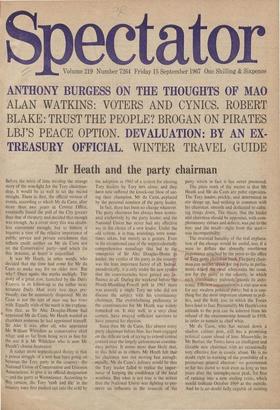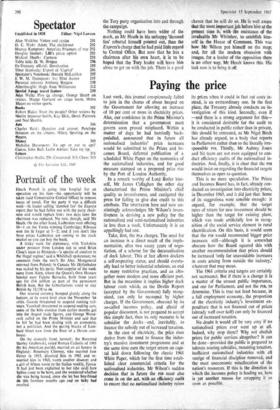Mr Heath and the party chairman
Before the mists of time envelop the strange story of the non-fight for the Tory chairman- Ship, it would be as well to set the record straight. There is, first, the official version of events, according to which Mr du Cann, after more than two years at Central Office, eventually found the pull of the City greater than that of theparty and decided that enough was enough. As a cover story this was doubt- less convenient enough; but to believe it requires a view of the relative importance of public service and private enrichment that reflects credit neither on Mr du Cann nor on the Conservative party—and which (in this instance, at least) is unjustified.
It was Mr Heath, in other words, who decided that the time had come for Mr du Cann to make way for an older man. But why? Once again, the. myths multiply. The story of a great row, launched by the Daily express in its follow-up to the rather more accurate Daily Mail story two days pre- yiously, can be summarily dismissed. Mr du Cann is not the sort of man one has rows with. Equally wide of the mark is the explana- tion that, as Sir Alec Douglas-Home had appointed Mr du Cann, Mr Heath wanted as chairman someone he had appointed himself. Sir Alec it was, after all, who appointed Mr William Whitelaw as conservative chief whip; and so far from being next in line for the axe it is Mr Whitelaw who is now Mr Heath's closest lieutenant. the adoption in 1965 of a system for electing Tory leaders by Tory MI'S alone; and they have now suffered the knock-out blow of see- ing their champion. Mr du Cann, .replaced by the personal nominee of the party leader.
In fact, there has been no change whatever: The party chairman has always been nomin- ated exclusively by the party leader,-and the National Union has never had any effective, say in the choice of a new leader. Under the old system, it is true, soundings were some- times taken, but merely as a gesture. Even in the exceptional case of the unprecedentedly comprehensive soundings that led to the emergence of Sir Alec Douglas-Horrie leader, the verdict of the party in the coun was the least important factor of all. lndeeR1, paradoxically, it is only under the new systtm that the constituencies have gained any :in- fluence at all. During the weekend before the Heath-Maudling-Powell poll in 1965 there was scarcely a single Tory mr who did not discuss the subject with his constituency chairman. The overwhelming preference in the constituencies for Mr Heath was widely remarked on. It may well, in a very close contest, have swayed sufficient waverers to have ensured his election.
Since then Mr du Cann, like almost every party chairman before him, has been engaged on the delicate task of trying to extend central control over the largely autonomous constitu- ency parties. It seems more than likely that, in this field as in others, Mr Heath felt that his chairman was not moving fast enough; equally, Mr du Cann's defence would be that the Tory leader failed to realise the impor- tance of keeping the confidence of the local worthies. But what is not true is the notion that the National Union was .fighting to pre- serve an influence in the councils of the party which in fact it has never possessed.
The plain truth of the matter is that Mr Heath and Mr du Cann are polar opposites. The Tory leader, prickly, and determined to stir things up, had nothing in common with his chairman, smooth and dedicated to calm- ing things down. The theory that the leadei and chairman should be'opposites, with corn-. plernentary virtues and defects, was put to the test; . and the result—right from 'the start— was incompatibility.
The essential banality of the real explana-, tion of the:change would be useful, too, if it were to deflate the absurdly overblown . &once attached by the press to the office df eryaartiaililiiiiiiitittiellk:rhe party chair- ma p Fap nelliitirvq•batfor th party in parlia-!
menfe titsrejiief whiparules the roost; nor for the party in the atintry, in which each ConstialtifIcy jealously guards its auto- nomy. EllieiMaloganisation;is a sine qua non for any modern political patty; but it is any- thing but the most important element in poli- tics, and the field, too, in which the Tories have least to fear. Presumably Mr Heath's own attitude to the post can be inferred from his refusal of the chairmanship himself in 1958, in order to remain as chief whip.
Mr du Cann, who has turned down a shadow cabinet post, still has a promising political career ahead of him. Meanwhile, in Mr Barber, the Tories have an intelligent and likeable new chairman. with an occasionally very effective line in caustic abuse. He is no doubt right in warning of the possibility of a premature general election : no government so far has dared to wait even as long as two years after the unemployment peak, for fear of running into a new sterling crisis, which would indicate October 1969 at the outside, And he is no doubt fully capable of steering the Tory party organisation into and through the campaign.
Nothing could have been wider of the mark, as Mr Heath in his unhappy 'damned lies' rebuttal himself pointed out, than the Express's charge that he had paid little regard to Central Office. But now that he has a chairman after his own heart, it is to be hoped that the Tory leader will leave him alone to get on with the job. There is a good chance that he -will do so. He is well aware that the most important job before him at the present time is, with the assistance of the invaluable Mr Whitelaw, to establish him- self in the House of Commons. This was how Mr Wilson put himself on the map; and, for all the modern obsession with images, for a leader of the opposition there is no other way. Mr Heath knows this. His task now is to brime it off.































